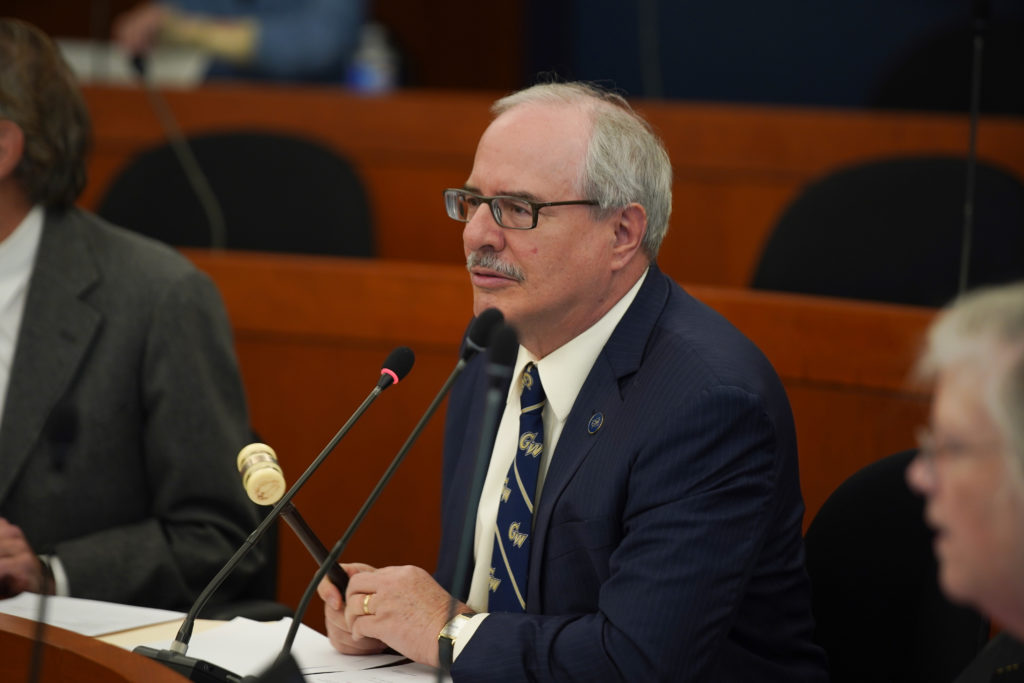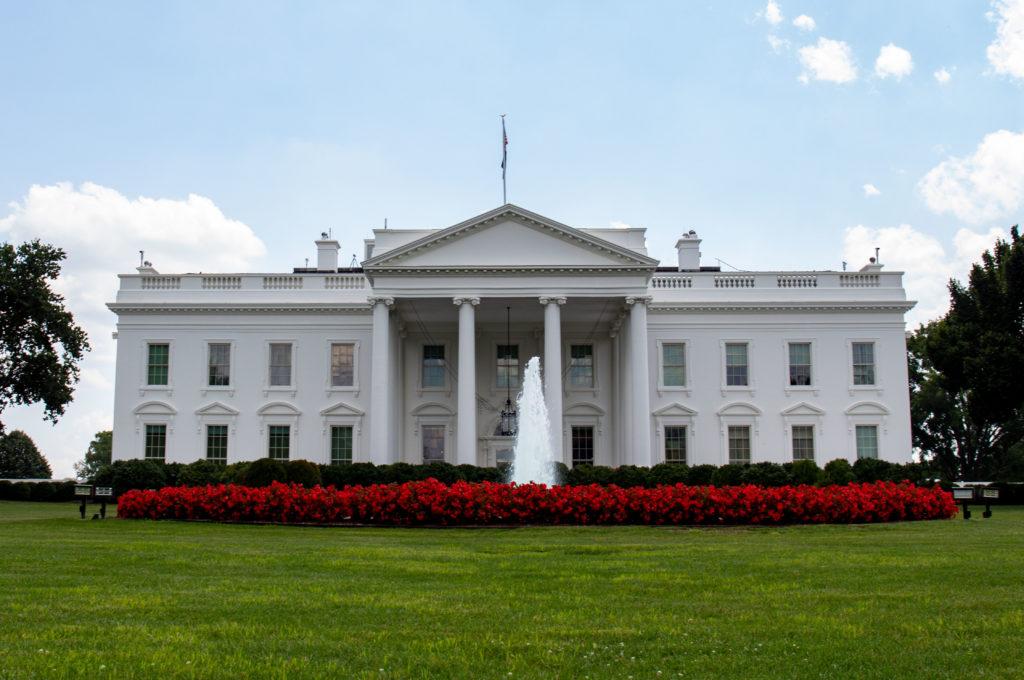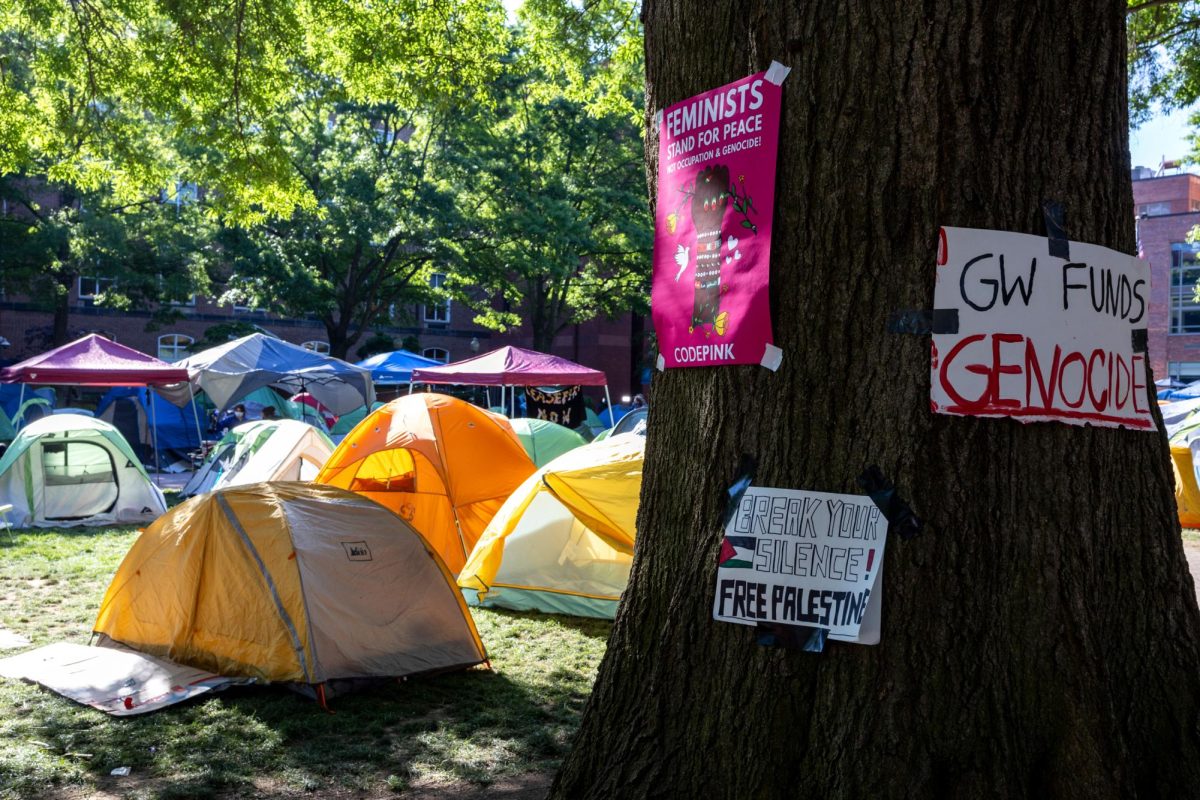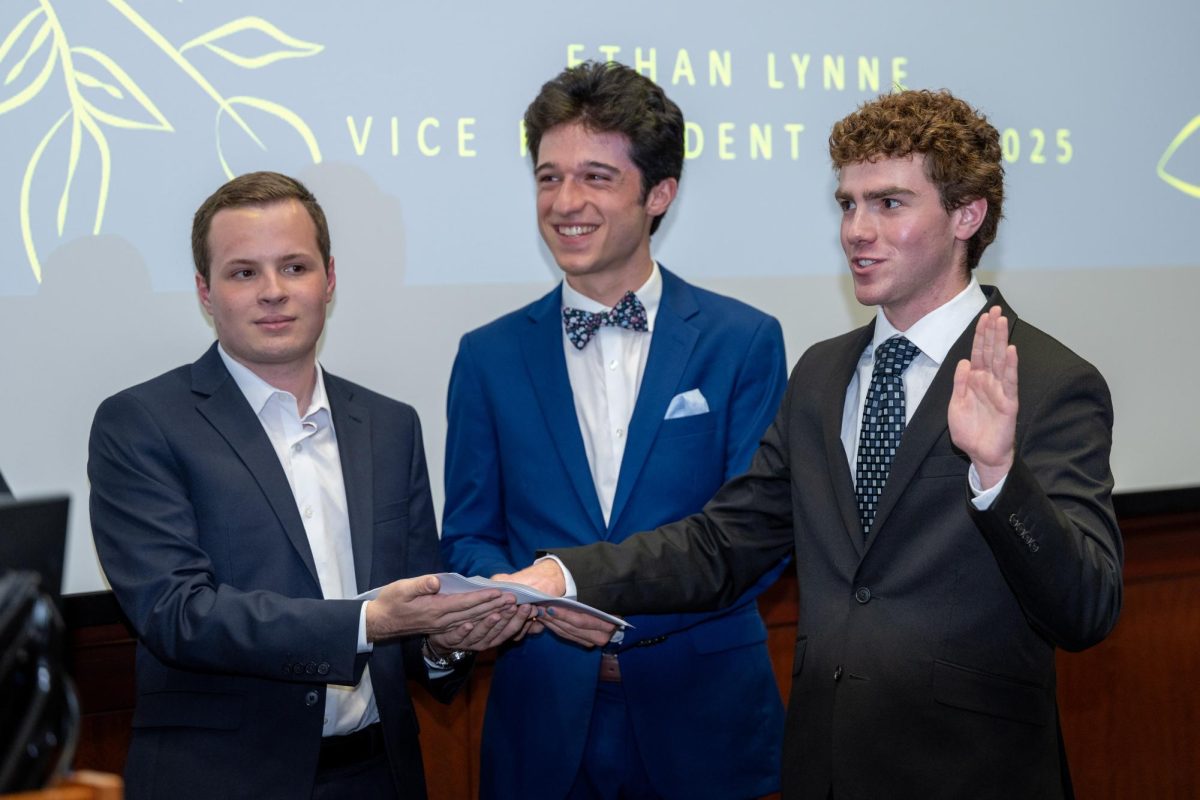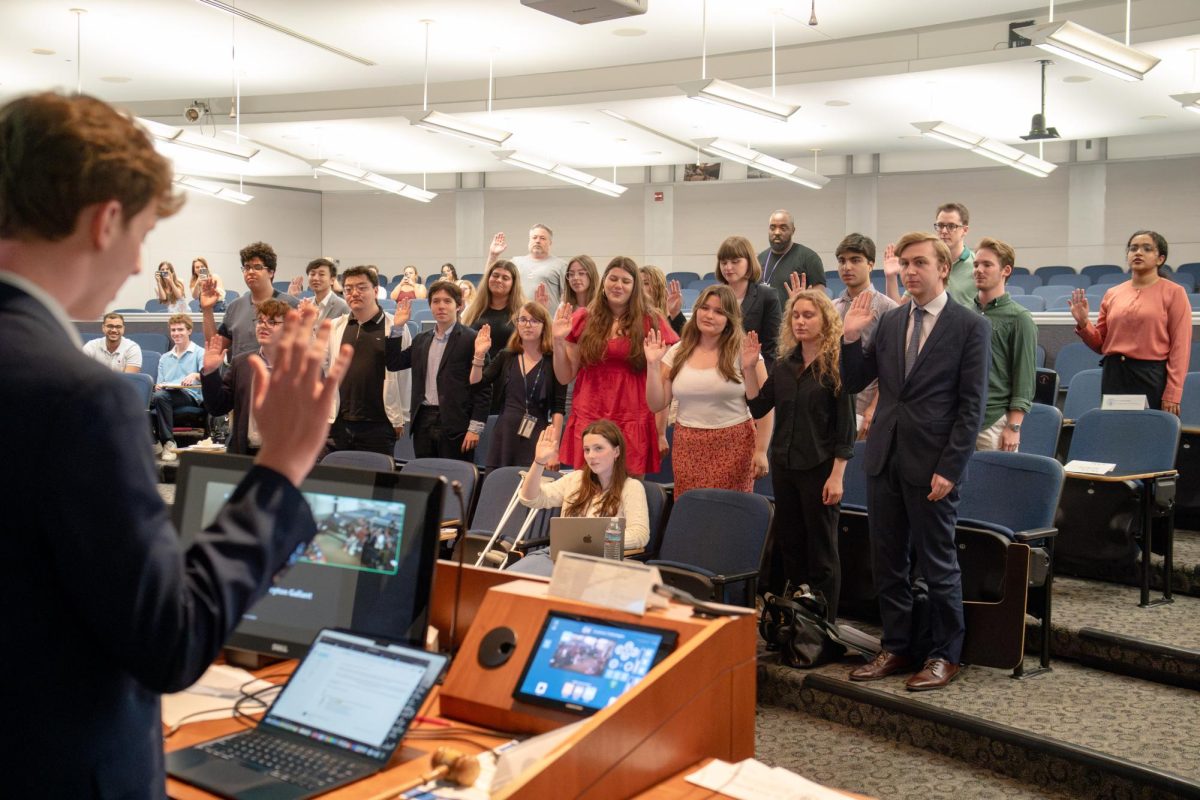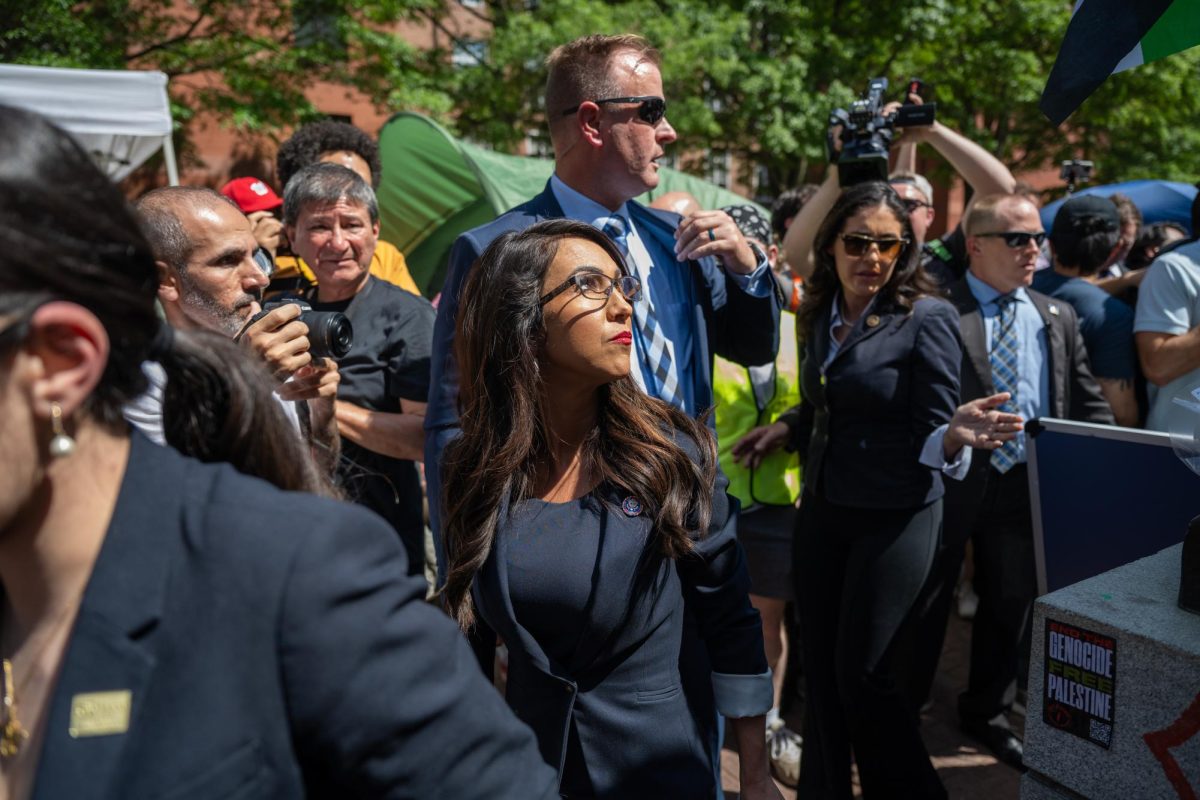Experts say the results from a recent faculty survey of top administrators could affect University President Thomas LeBlanc’s future at GW.
Officials released the survey’s quantitative results in February before releasing the qualitative results earlier this month, both of which found that a majority of full-time faculty lack confidence in LeBlanc. Some experts in higher education administration said the findings are not enough for the Board of Trustees to ask LeBlanc to leave, while others said faculty’s initial approval of the survey itself indicates a lack of trust in his leadership abilities, which could be enough for the Board to remove him.
Faculty voted in November to conduct a survey of University leadership amid rising tensions between the GW community and administrators.
George Justice, a professor of English at Arizona State University who has written about higher education administration, said he would not be surprised if LeBlanc steps away within the next year or two or if the Board asks him to leave GW given the “overwhelmingly negative” faculty sentiment indicated in the survey results.
“If this high-quality faculty, uniformly across the various academic bodies signaled their displeasure with the leadership, most often a board of trustees – even if it agrees with the president – are not going to be able to stand by the president,” he said.
The Board started conducting its regular assessment of LeBlanc this month with an outside facilitator that will “meet with stakeholders” and “summarize their perspectives.” The Board last conducted a review of LeBlanc in spring 2019 with the help of a third party.
Board Chair Grace Speights said in an interview in February that she has been invited to review the survey results but will rely on the Board’s standard review of LeBlanc to decide whether or not to extend his contract this summer. The outside consultant will review the survey results, according to an announcement from the Board.
“We’re going to rely on a process that we put into place to make sure that we have a fair and independent process,” Speights said. “That’s what we’ve done with every president, and that’s what will be considered.”
A University spokesperson declined to comment on the initial release of the results, deferring to the announcement of the Board’s standard review of LeBlanc.
The survey’s qualitative results indicate that faculty sentiment across all 10 schools at GW is more negative than positive, and results did not vary by faculty rank.
Justice said the level of disapproval expressed in the results could be enough to have the same impact as a vote of no confidence because part of GW’s prestige comes from its “high-quality” faculty. He said if there is a vote of no confidence, the Board could either ask LeBlanc to slowly transition out or resign completely.
“It’s really hard for an administration to weather this kind of criticism from a very high-quality faculty, but at the same time I don’t think he’s ‘done the wrong thing’ from the trustees’ perspective,” he said. “But it’s going to be hard for them to keep him on, even if as I suspect, he’s doing what they want him to do.”
Justice said the Board – which has largely backed LeBlanc despite increasing frustration from the GW community – may approve of his work since his arrival at GW but may not be able to continue supporting him in light of the faculty criticisms indicated in the survey results.
“Until you find out who the next president is going to be, it’s going to be unclear whether he’s a scapegoat for policies trustees really wish to put in place regardless or whether somehow he veered off track,” he said.
Chris Bonneau, the president of the Faculty Senate at the University of Pittsburgh, said faculty wouldn’t have voted to conduct a survey of University leadership if they didn’t already doubt LeBlanc’s abilities.
“It’s not a vote of no confidence, but it’s pretty damn close,” he said.
Bonneau said even if the Board renews LeBlanc’s contract to allow him to stay at GW, he may face “a lot of opposition” to his work.
“When the president loses the confidence of the faculty like that, and it’s very public, that is not a good situation for anybody,” he said.
Eddie Rice Cole, an associate professor of higher education and organizational change at UCLA, said he doesn’t think the Board will make any major changes to University leadership without an official vote of no confidence in LeBlanc from the faculty. But he said the survey’s release could at least encourage the Board to take the results into consideration as part of their review of the president.
“Considering that this is not a formal vote of no confidence, this is a survey of faculty sentiment, I think it will catch trustees’ attention, but I’m not sure if this would be a deciding factor on its own in whether they decide to keep the president at your university or not,” he said.
Cole said a vote of no confidence is “most often” enough for a board of trustees to consider changes in leadership because it indicates that the president will face difficulty in “effectively” leading a university.
“At the end of the day, all eyes are on whether or not the GW faculty will issue a vote of no confidence – that’s ultimately what it comes down to,” he said. “Resolutions and disapprovals, those are important statements because they capture the sentiment of the faculty. But again, until your faculty senate takes a formal vote on confidence and leadership, that’s kind of where I lean.”
Cole said administrators should meet with faculty leaders like senators and other GW community members in regular public forums to discuss University policies, maintain transparency within the administration and rebuild trust between GW leaders and community members.
“That’s how you build confidence in a leader,” he said. “Because if faculty feel as if their voice isn’t being considered, if they feel as if faculty governance has been dismissed by a small group of administrators, that’s when confidence is lost.”
Noelle Arnold, a senior associate dean and professor of educational administration at The Ohio State University, said if the Board decides to renew LeBlanc’s contract despite the survey results, faculty could opt to protest by choosing not to teach.
Professors from the Faculty Association, an independent group of full-time faculty, developed a set of “GWUFA memes” last fall as tensions between faculty and LeBlanc escalated to express their disapproval with LeBlanc and Speights. The graphics included claims that some faculty will be unavailable to students on Wednesdays in protest of LeBlanc or will give students A’s to “unburden faculty from the considerable labors of grading.”
“One of the things that’s really difficult is that there are not a lot of great examples in higher ed of leaders who’ve actually had issues that have reached a boiling point, where they’ve remained and then been successful after that,” Arnold said. “And so you have to ask yourself, even if they remain another year or two, how successful are presidents at ‘turning that around,’ so to speak?”
She said students might also opt to transfer to a different school or applications could dip if LeBlanc remains at GW. Arnold said the University of Missouri witnessed a similar dip in applications and subsequently a loss of revenue after student protests over administrators’ failure to address incidents of racism.
“Certainly I think with students, students have been sort of powerful voices in various issues that are happening on campus,” she said.


